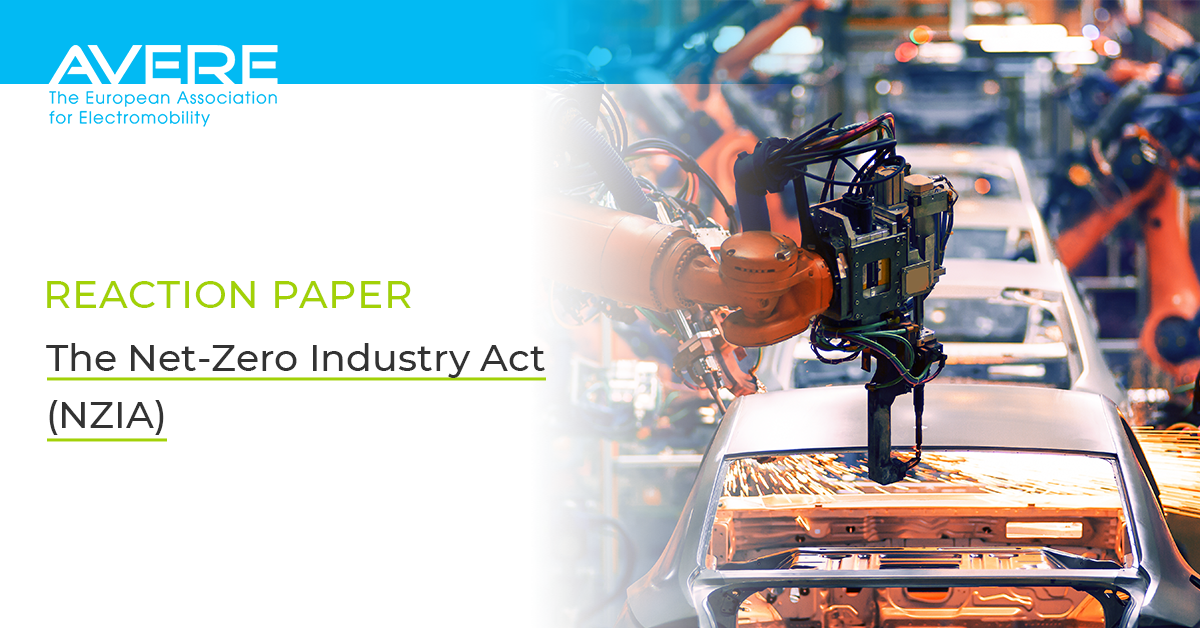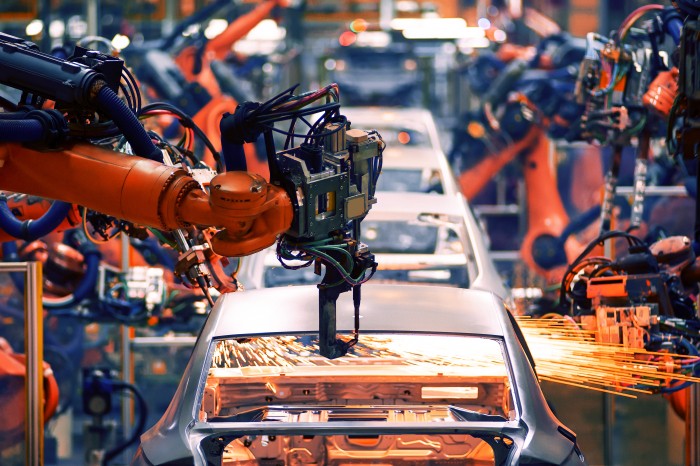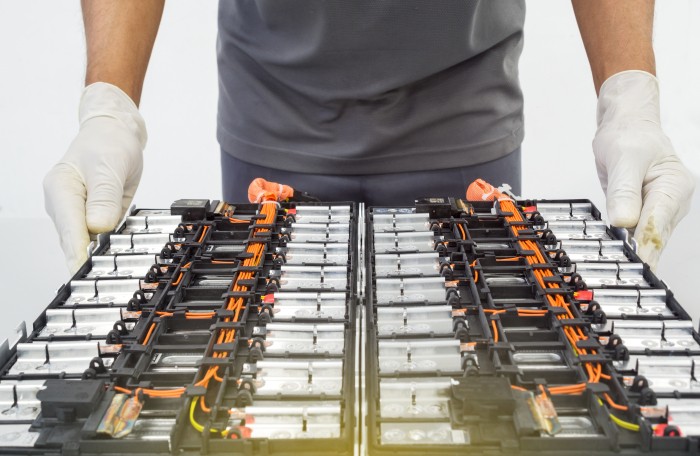
AVERE welcomes the European Commission's proposal for a Net-Zero Industry Act (NZIA).
This legislative proposal, combined with other recently proposed legislation such as the Critical Raw Materials Act (CRMA), has the potential to harness Europe's innovative industry and help it thrive in order to achieve Europe's net-zero emissions goals by 2050.
REACTION PAPER
to the Net-Zero Industry Act (NZIA)

AVERE welcomes the European Commission's proposal for a Net-Zero Industry Act (NZIA).
This legislative proposal, combined with other recently proposed legislation such as the Critical Raw Materials Act (CRMA), has the potential to harness Europe's innovative industry and help it thrive in order to achieve Europe's net-zero emissions goals by 2050.
The current NZIA proposal is the first step in a constructive and necessary response to the challenges facing European industry in an increasingly competitive global market, with regions each designing new industrial plans, such as the US Inflation Reduction Act in North America.
The NZIA should establish a long-term, future-proof strategy that will serve as a compass for the European industrial fabric, encourage the creation of EU-based jobs, and strengthen the strategic autonomy of industries vital to the sustainable transition of the transport and energy sectors.
In particular, we welcome the ambitious targets for net-zero technology manufacturing capacity, especially with regard to the battery manufacturing sector, and the consideration of skills in this industrial transformation. However, AVERE believes that the current scope and the proposed tools will need to be improved and strengthened if the European Union is to achieve the proposed goals and position itself as a strong player on the global stage.
In order to put the European Union on the path to becoming a leading net zero industrial power, we suggest the following considerations:
1. Setting a clearer and broader scope
AVERE welcomes the inclusion of grid and battery technologies in the list of technologies covered by this proposed act. These technologies have proven both key and efficient to mitigate the effects of climate change. That being said, it should be noted that the current proposal does not explicitly cover recharging infrastructure technologies in its Annex. A future proof legislation must take into account and encourage the uptake of these technologies, especially to encourage greater uptake of smart and bidirectional charging technologies, all while stimulating innovation to achieve greater efficiency. The NZIA should also cover critical technologies linked to the IT infrastructure and softwares which are key enablers to the transition towards sustainable and digital mobility.
In addition, AVERE believes that the projects covered by the NZIA should go beyond manufacturing and also cover the deployment of net-zero technologies throughout the European Union. It is particularly important that the NZIA include the deployment of charging infrastructure within its scope and create a fast-track process to ensure that grid connections and the granting of planning permissions for EV charging and battery swapping infrastructure are delivered at a much faster pace to match the deployment of both light and heavy duty electric vehicles.
Last but not least, a clear list including battery technologies and grid and charging infrastructure technologies should be set in the Annex to clearly identify the technologies that are net-zero technologies.
2. Fast tracking permitting procedure
AVERE supports NZIA's proposal to reduce and better streamline administrative, planning and permitting procedures. At present, our industry is faced with cumbersome administrative procedures that hinder innovation, product development and discourage investment in European production facilities. This is especially true for start-ups and SMEs that do not have the resources to go through complex administrative procedures.
The proposed approach including faster permitting procedures, regulatory sandboxes, the creation of one-stop shops and bundled impact assessments is a good first step to make the European Union more attractive to innovative players, however, more ambition should be pushed forward if the EU is to become a leader in net-zero technology production.
The NZIA should become a starting point to review other european legislations related to the validation, certification and placing on the market of net-zero products to ensure these processes are further accelerated. We would welcome, for instance, the development of new guidelines that would help national and local authorities accelerate their assessment and approval of planning applications relating to all forms of EV charging and battery swapping infrastructure.
Additionally, the NZIA should allow for the creation of early start permits and the bundling of permits to allow project promoters to take the risk of pursuing multiple permits at the same time. This can either be done through the bundling several permits into one (e.g.: the merging of environmental permits and building permits) or allowing the pursuing of multiple permits at the same time instead of following a chronological approach.
3. Setting clear sustainability and efficiency rules for public procurements
AVERE welcomes the NZIA proposal to make public procurement procedures for the purchase of net-zero technologies subject to economic, sustainability and resilience criteria. Our association defends a vision of electrification of road transport because this is the most efficient and sustainable option to effectively decarbonise road transport and reach the European and global climate objectives.
As such, we welcome the NZIA’s proposal which allows public authorities to give the tender’s sustainability and resilience contribution a weight between 15% and 30% of the award criteria.
While the NZIA should create a wide framework for public procurement’ and not specify in detail which technology to cover, future delegated acts and guidelines of the European Commission should better support public authorities to establish sustainability, efficiency and resiliency criteria. This could notably be achieved through an identification of technologies respecting these criteria.
4. Supporting workers in their skills:
AVERE welcomes the focus on skills in the NZIA. Skills play an essential role in the transition of our European societies to climate neutrality. The e-mobility industry has the potential to create many jobs in Europe if the EU thinks carefully about its industrial strategy and especially if it accompanies its labour market in the transformation of jobs. New technologies and new industries require new sets of skills which workers currently do not all have.
We therefore welcome the creation of Net-Zero academies and apprenticeship programs dedicated to the European workforce. These academies have great potential, however, their curriculum and implementation should be carefully considered with the industry players involved in the field to ensure that the skills taught match the needs in the field. These academies should carefully consider the evolution of the net-zero technology ecosystems and support the upskilling and reskilling of workers according to these changes. For example, in the automotive industry, we see that the transition to e-mobility is creating new jobs in battery, connectivity, IT, R&D, recharging, which require a new set of skills that the traditional automotive industry did not need.
Since companies are often in the best position to identify their needs, many industry players have started to develop their own academies. Local authorities should better support these initiatives through public-private partnerships or funding.
Lastly, the importance of research is key and European projects such as Life and Horizon projects have a key role to play in the future. The NZIA should serve as a basis to re-emphasise the importance of these projects and allocate greater funds to support research which is key to equip workers with the right set of skills.

5. Establishing a clear and harmonised monitoring and governance structure
AVERE welcomes the NZIA’s proposal to set monitoring requirements for Member States, particularly with respect to production volumes of net-zero technologies. In order to effectively track these trends across the European Union, we call on legislators to ensure that the European Commission supports national public authorities with guidelines and reporting templates to ensure that data is easily comparable across countries.
In addition, these reports and data should be easily accessible in a transparent and digitized manner so that every citizen of the European Union can keep up with the latest trends in net-zero technologies.
